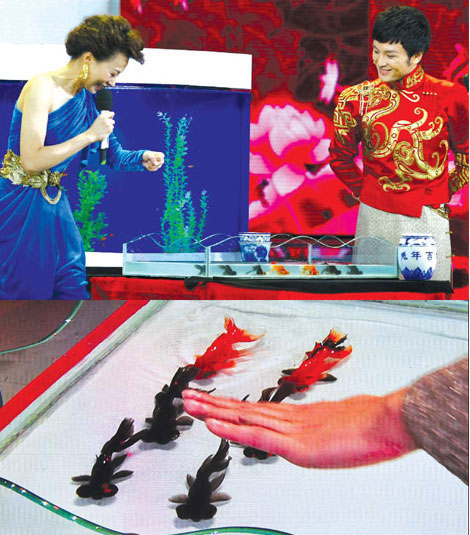Something 'fishy' about this trick
Updated: 2011-02-18 11:08
By Li Jing, Hu Yongqi and Duan Yan (China Daily European Weekly)
 |
|
Magician Fu Yandong (right) performs a magic trick that makes goldfish swim in a formation during CCTV's Spring Festival gala. The show has irked activists as they feel such acts harm animals. Photos provided to China Daily |
It was not only the trick that got the maximum bouquets, but also the one that got innumerable brickbats. Millions of Chinese citizens were glued to their television sets during the Spring Festival gala show aired by China Central Television Station (CCTV) on Feb 2, and watched with bated eyes the famous magician making goldfish swim in a formation.
True to his word, the magician made the six goldfish swim in two straight lines, moving left and right, in a glass container to the tune of a whistle much like the military drills.
The show was a runaway hit and such was its popularity that its recordings were hot favorites on the Internet. There were also several instances of wannabe magicians attempting to replicate the trick. But the euphoria soon waned and the illusionary feat was branded with a 'cruelty to animals' tag.
Animal rights groups were the first off the block and soon after the show was aired, came out with claims that the goldfish owner had tortured his pets by force feeding them metal objects and then drilled them with the help of magnets.
Allegations continued to be traded back and forth and soon it became the most-debated topic in the virtual world.
What really tipped the iceberg was the video posted by an anonymous netizen in which he attempts to replicate the magic trick by trying to feed the goldfish super glue and metal beads. The trick failed when the goldfish spat out the metal beads, says his detailed post on Tianya.cn, one of the most popular online communities in China.
Undeterred, the netizen then tried to attach magnetic plates under the goldfish's stomachs using super glue. That attempt also failed, as the fish stomach was too slippery.
In a last-ditch effort he then crammed magnets into the goldfish's mouths and then sealed them with super glue. "That worked as after the glue dried up, the magnets did not fall out," he says. But tragedy struck when the goldfish died just as he was getting ready to film the experiment.
Animal rights groups have condemned the experiment as they feel that such attempts could endanger the lives of more goldfish, revered as symbol of wealth in China.
Anhui News, an online media company in Anhui province, has reported that an increasing number of children are buying goldfish along with their parents at fish markets due to the influence of the magic trick.
Animal lovers in China are irked by the fact that there are no available laws in the country to punish such offenders. Though China passed a law for protecting wild animals in 1988, its scope does not extend to categories like pets, livestock and experimental animals.
More than the magic trick TV show, it is the copycats that the animal rights groups are more worried about. The activists feel that lives of several animals could be at stake as untrained people attempt to perform such feats.
The animal abuse debate has also put the media in the spotlight, with most campaigners urging the fourth estate to champion animal ethics.
Fu Yandong, the magician and goldfish owner, however, does not reveal how he achieved his magic feat. The 35-year-old performer comes from a reputed family of magicians in Beijing, with his father Fu Tenglong referred to as the "King of Magic" in China.
"We have heard of several cases of people trying to replicate our goldfish trick. But they all did it the wrong way. Fu has categorically urged the imitators to stop such attempts," says his agent Liang Ming.
Fifty-three animal welfare organizations have sent a joint letter to CCTV and other stations urging them not to telecast such shows in the future.
The activists feel that without proper laws and regulations in place to punish the offenders, scores of animals would be subject to brutal torture and injury by copycats.
The letter also seeks a third-party expert review on the risks of animal abuses in such performances and a ban on such programs. They have also urged channels to run a "do-not-imitate" moving ticker throughout the program.
The absence of legislation is not the only thing that has irked animal lovers.
"Even without specific animal protection laws, the goldfish trick still violates the fundamentals of related regulations on animal welfare in China," says Qin Xiaona, director of the Beijing-based Capital Animal Welfare Association.
Qin argues that the State Forestry Administration and Ministry of Housing and Urban-Rural Development has banned live animal shows at all wildlife parks and zoos in China.
"That regulation actually suggests that we humans should not entertain ourselves by causing pain to animals," she says.
Although the ban does not literally apply to TV programs, Qin feels that influential media outlets like CCTV should be discreet when staging any animal-related programs, especially during the Spring Festival Gala, as it is probably the most viewed TV show in China.
According to statistics from Beijing-based CSM Media Research, the number of viewers in China who watched this year's Spring Festival Gala exceeded 30 percent, the highest in recent times.
Liu Huiyi, a researcher at the Da'erwen Nature Association, a Beijing-based NGO that co-authored the letter, says animal performances in some nations are allowed only after experts confirm that the performance is not harmful to animals.
"Although there is no specific regulations to punish people who abuse animals, we should keep an eye out for the offenders. In large parties or ceremonies, people should be reminded of the idea that animals are friends of human beings and need to be protected," says Liu.
The joint letter, which was also sent to the State Administration of Radio, Film and Television and the Ministry of Culture, is, however, yet to get an official response.
The goldfish trick, has however, got backing from ardent fans of magic. "The magic trick was amazing, but we will try to replicate the experiment by torturing fish," says Hu Yunshi, a 34-year old resident of Anqing in Anhui province. Hu is an ardent fan of magic and a keen CCTV Spring Festival program watcher for the past 10 years.
In what could be sweet music for the much-beleaguered hoist CCTV, activists like Qin have a word of praise for the channel.
"The CCTV gala did promote animal protection, when the directors and costume designers refused to use real fur in their dresses," she says.
Guo Pei, chief costume designer of the gala, dropped her original plan to use sealskin decorations in the dresses for hostesses after receiving appeals from animal protection groups and the public.
"The mass media has a role to play in forming public values and ethics," says Qin, adding "protecting animals is in line with the Chinese belief of living harmoniously with the nature."
The goldfish performance was not the only controversy on animal welfare during the Spring Festival holidays. More than 30 galas were broadcast on provincial TV channels nationwide, and the fur clothes worn by the actors and hostesses came in for severe criticism.
E-paper

Ear We Go
China and the world set to embrace the merciful, peaceful year of rabbit
Preview of the coming issue
Carrefour finds the going tough in China
Maid to Order
Specials

Mysteries written in blood
Historical records and Caucasian features of locals suggest link with Roman Empire.

Winning Charm
Coastal Yantai banks on little things that matter to grow

New rules to hit property market
The State Council launched a new round of measures to rein in property prices.
